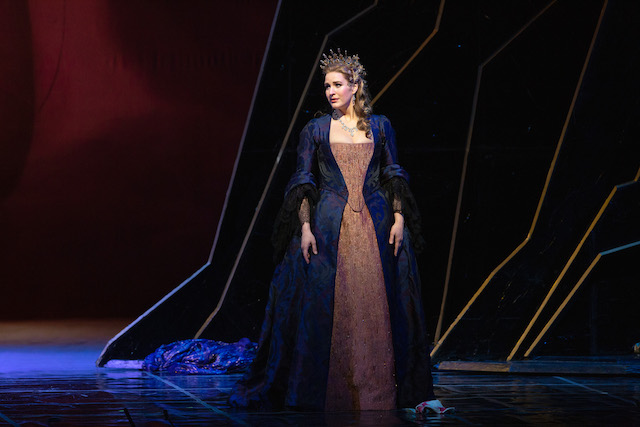Lise Davidsen soars in Met Opera’s delightful “Ariadne”
The late Elijah Moshinsky’s 1993 production of Strauss’s Ariadne auf Naxos for the Metropolitan Opera is one of its most beautiful, fanciful and witty. The sight of the three nymphs floating across the stage atop towering skirts is pure magic. They, however, were not the draw for this long-anticipated revival; rather it was Lise Davidsen’s appearance in the title role. The Met assembled a fine cast, but vocally she was in a league of her own.
In Richard Strauss and Hugo von Hofmannsthal’s 1916 opera, high art collides head-on with comedy. The prologue is set backstage in the private theater of the richest man in Vienna, who arranges for both the premiere of a serious opera based on the Greek myth of Ariadne and a performance by a commedia dell’arte troupe as after-dinner entertainment. Everything is upended when he decides that the two entertainments should be performed simultaneously.
The opera that follows finds Ariadne on the island of Naxos, having been abandoned by Theseus. Inconsolable, she cries incessantly and longs for death. A traveling group of comedians happens upon her and tries to cheer her up, but fails. The young god Bacchus arrives and, in a rapturous duet, Ariadne is ablaze with passion while Bacchus muses over his divinity. Zerbinetta, one of the comedians who told Ariadne there are plenty of fish in the sea, so to speak, gets that last laugh.
In the prologue, Wolfgang Brendel presided over the backstage contretemps as a deliciously funny, ego-inflated Major-Domo. Johannes Martin Kränzle’s Music Master was, in contrast, a sympathetic mentor to Isabel Leonard’s Composer. Leonard’s velvety mezzo-soprano and boyish manner created the perfect picture of an impetuous, uncompromising youth. The scene in which Brenda Rae’s Zerbinetta consoles the Composer and offers him hope was quite touching.
Rae’s voice is on the smallish side for the Met but it is ravishingly beautiful, especially in the uppermost notes of her range. Her Zerbinetta wasn’t so much a coquette as a savvy, lusty woman of the world with pluck and heart. Her showpiece aria, “Großmächtige Prinzessin … So war es mit Pagliazzo,” was dispatched with astonishing ease.
Sean Michael Plumb, in his Met debut, was a frisky Harlequin with an impressive voice. In the minor role of Truffaldino, Ryan Speedo Green still managed to shine. Given a chance, he might someday equal Davidsen in vocal allure and power, judging by his recent appearance at Carnegie Hall in Beethoven’s Ninth Symphony.
Brandon Jovanovich is a master of complex characterizations and vocally he is no slouch either. Bacchus, however, is about as one-dimensional a character as one finds in opera. Vocally outgunned by Davidsen, Jovanovich wisely resisted the urge to push his voice to the breaking point to match her in terms of volume. By the look on his face, one couldn’t help but think that Jovanovich was a just little in awe of what he was hearing.
Marek Janowski is a fascinating conductor to watch. There is not a whiff of showmanship about him and he has a beat as clear as they come. The result was a scintillating, transparent reading of Strauss’s lush score. Janowski knows how to cushion a voice with full, rich orchestral sound and with that support, Davidsen could let her voice soar.
Davidsen is the great hope of Wagnerians. Ariadne was the first opportunity that Met audiences have had to experience Davidsen’s voice in the repertoire that she was born to sing. Gorgeously costumed with a starry crown on her head, Davidsen’s Ariadne was regal, but quite feminine — the polar opposite of Rae’s sensuous, worldly take on Zerbinetta.
This, however, was one not one long blast-fest, as Davidsen only let her voice bloom in the final scene were Ariadne is ablaze with love. The rest of the time, there were glimpses of its grandeur, but Davidsen was alert to the role’s subtler aspects, both musically and dramatically. In part due to Janowski’s seamless approach to the score, Ariadne’s aria, “Es gibt ein Reich,” arose organically from the musical texture and not as a grand pronouncement.
This is a must-see performance by a singer in her prime. But if you miss it, Davidsen returns this season as Chrysothemis in Elektra.
Ariadne auf Naxos continues through March 17. metopera.org
